Hotel & Hospitality Management: Creating Memorable Experiences Report
VerifiedAdded on 2022/11/25
|6
|1290
|142
Report
AI Summary
This report provides a comprehensive analysis of hotel and hospitality management, emphasizing the crucial role of guest experience in the industry. It explores the various elements that constitute a positive guest experience, such as service reliability, customer care, food quality, and pricing policies. The report also evaluates the significance of employees in creating memorable experiences, discussing the application of internal and interactive marketing theories like price theory, promotion theory, and product theory. Furthermore, it reflects on the consequences of prioritizing positive guest experiences versus the negative outcomes of neglecting service and employee performance. The report highlights the benefits of satisfied customers, including enhanced hotel image, increased client numbers, and improved organizational performance. It concludes by emphasizing the importance of training hotel personnel to deliver exceptional services consistently.
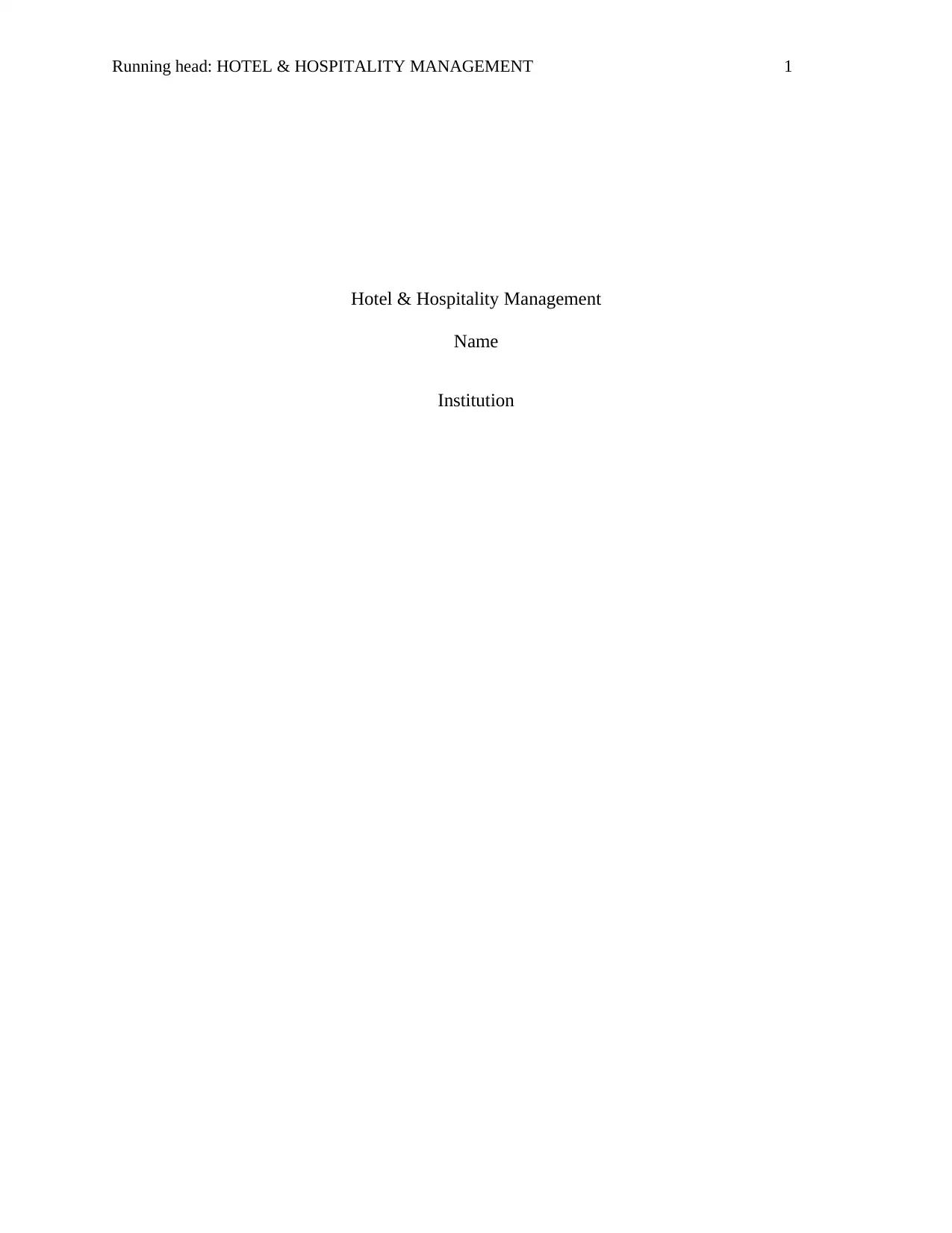
Running head: HOTEL & HOSPITALITY MANAGEMENT 1
Hotel & Hospitality Management
Name
Institution
Hotel & Hospitality Management
Name
Institution
Paraphrase This Document
Need a fresh take? Get an instant paraphrase of this document with our AI Paraphraser
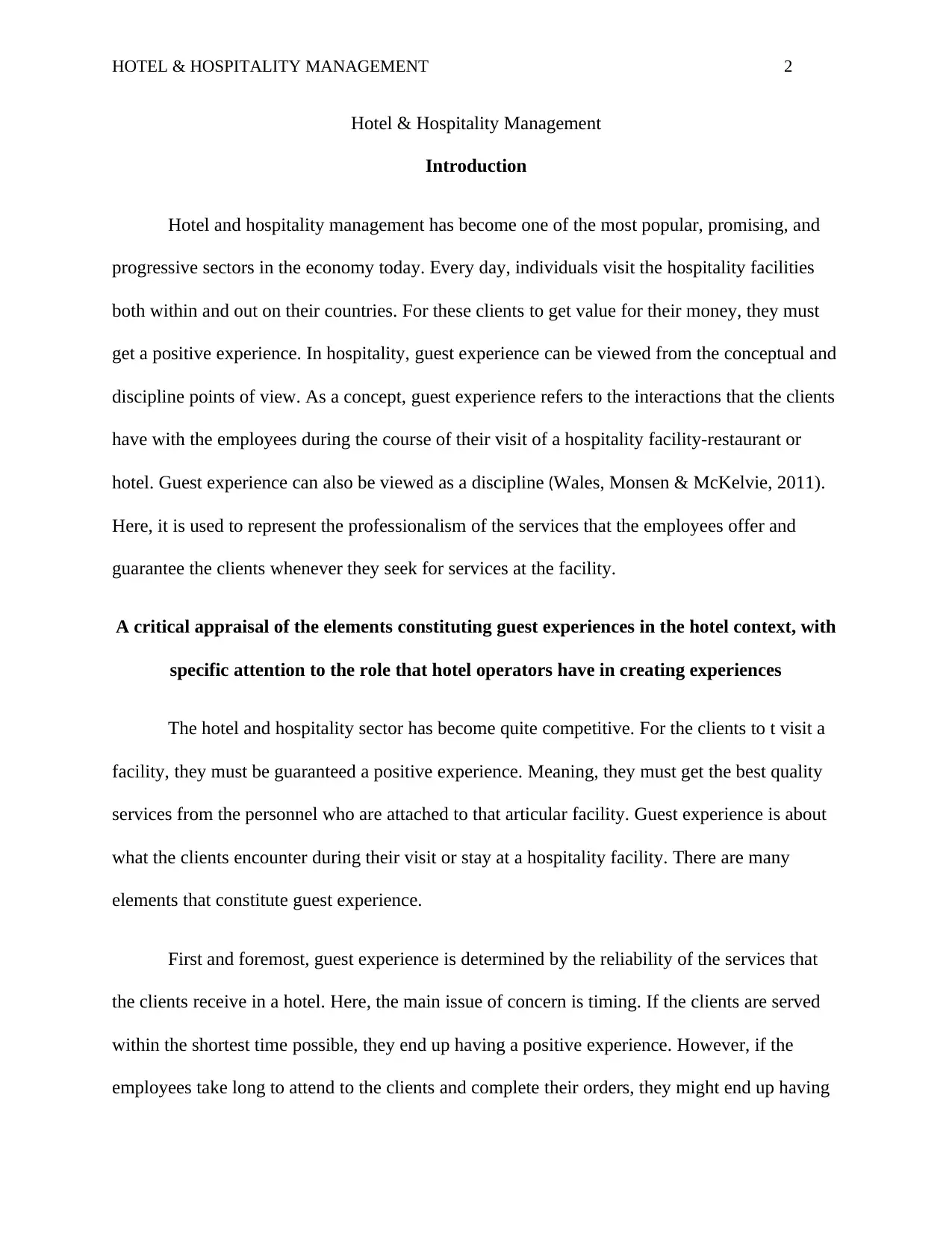
HOTEL & HOSPITALITY MANAGEMENT 2
Hotel & Hospitality Management
Introduction
Hotel and hospitality management has become one of the most popular, promising, and
progressive sectors in the economy today. Every day, individuals visit the hospitality facilities
both within and out on their countries. For these clients to get value for their money, they must
get a positive experience. In hospitality, guest experience can be viewed from the conceptual and
discipline points of view. As a concept, guest experience refers to the interactions that the clients
have with the employees during the course of their visit of a hospitality facility-restaurant or
hotel. Guest experience can also be viewed as a discipline (Wales, Monsen & McKelvie, 2011).
Here, it is used to represent the professionalism of the services that the employees offer and
guarantee the clients whenever they seek for services at the facility.
A critical appraisal of the elements constituting guest experiences in the hotel context, with
specific attention to the role that hotel operators have in creating experiences
The hotel and hospitality sector has become quite competitive. For the clients to t visit a
facility, they must be guaranteed a positive experience. Meaning, they must get the best quality
services from the personnel who are attached to that articular facility. Guest experience is about
what the clients encounter during their visit or stay at a hospitality facility. There are many
elements that constitute guest experience.
First and foremost, guest experience is determined by the reliability of the services that
the clients receive in a hotel. Here, the main issue of concern is timing. If the clients are served
within the shortest time possible, they end up having a positive experience. However, if the
employees take long to attend to the clients and complete their orders, they might end up having
Hotel & Hospitality Management
Introduction
Hotel and hospitality management has become one of the most popular, promising, and
progressive sectors in the economy today. Every day, individuals visit the hospitality facilities
both within and out on their countries. For these clients to get value for their money, they must
get a positive experience. In hospitality, guest experience can be viewed from the conceptual and
discipline points of view. As a concept, guest experience refers to the interactions that the clients
have with the employees during the course of their visit of a hospitality facility-restaurant or
hotel. Guest experience can also be viewed as a discipline (Wales, Monsen & McKelvie, 2011).
Here, it is used to represent the professionalism of the services that the employees offer and
guarantee the clients whenever they seek for services at the facility.
A critical appraisal of the elements constituting guest experiences in the hotel context, with
specific attention to the role that hotel operators have in creating experiences
The hotel and hospitality sector has become quite competitive. For the clients to t visit a
facility, they must be guaranteed a positive experience. Meaning, they must get the best quality
services from the personnel who are attached to that articular facility. Guest experience is about
what the clients encounter during their visit or stay at a hospitality facility. There are many
elements that constitute guest experience.
First and foremost, guest experience is determined by the reliability of the services that
the clients receive in a hotel. Here, the main issue of concern is timing. If the clients are served
within the shortest time possible, they end up having a positive experience. However, if the
employees take long to attend to the clients and complete their orders, they might end up having
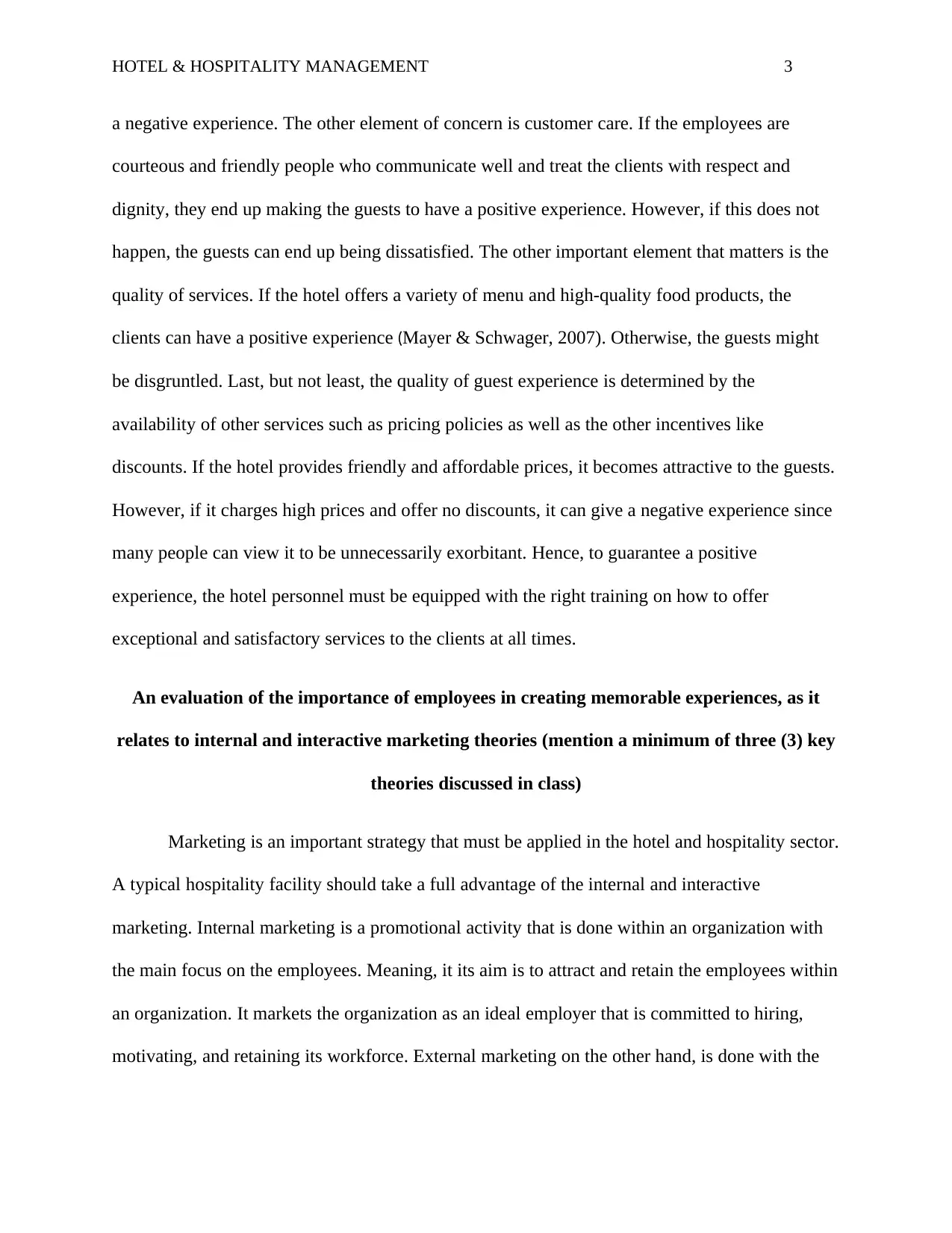
HOTEL & HOSPITALITY MANAGEMENT 3
a negative experience. The other element of concern is customer care. If the employees are
courteous and friendly people who communicate well and treat the clients with respect and
dignity, they end up making the guests to have a positive experience. However, if this does not
happen, the guests can end up being dissatisfied. The other important element that matters is the
quality of services. If the hotel offers a variety of menu and high-quality food products, the
clients can have a positive experience (Mayer & Schwager, 2007). Otherwise, the guests might
be disgruntled. Last, but not least, the quality of guest experience is determined by the
availability of other services such as pricing policies as well as the other incentives like
discounts. If the hotel provides friendly and affordable prices, it becomes attractive to the guests.
However, if it charges high prices and offer no discounts, it can give a negative experience since
many people can view it to be unnecessarily exorbitant. Hence, to guarantee a positive
experience, the hotel personnel must be equipped with the right training on how to offer
exceptional and satisfactory services to the clients at all times.
An evaluation of the importance of employees in creating memorable experiences, as it
relates to internal and interactive marketing theories (mention a minimum of three (3) key
theories discussed in class)
Marketing is an important strategy that must be applied in the hotel and hospitality sector.
A typical hospitality facility should take a full advantage of the internal and interactive
marketing. Internal marketing is a promotional activity that is done within an organization with
the main focus on the employees. Meaning, it its aim is to attract and retain the employees within
an organization. It markets the organization as an ideal employer that is committed to hiring,
motivating, and retaining its workforce. External marketing on the other hand, is done with the
a negative experience. The other element of concern is customer care. If the employees are
courteous and friendly people who communicate well and treat the clients with respect and
dignity, they end up making the guests to have a positive experience. However, if this does not
happen, the guests can end up being dissatisfied. The other important element that matters is the
quality of services. If the hotel offers a variety of menu and high-quality food products, the
clients can have a positive experience (Mayer & Schwager, 2007). Otherwise, the guests might
be disgruntled. Last, but not least, the quality of guest experience is determined by the
availability of other services such as pricing policies as well as the other incentives like
discounts. If the hotel provides friendly and affordable prices, it becomes attractive to the guests.
However, if it charges high prices and offer no discounts, it can give a negative experience since
many people can view it to be unnecessarily exorbitant. Hence, to guarantee a positive
experience, the hotel personnel must be equipped with the right training on how to offer
exceptional and satisfactory services to the clients at all times.
An evaluation of the importance of employees in creating memorable experiences, as it
relates to internal and interactive marketing theories (mention a minimum of three (3) key
theories discussed in class)
Marketing is an important strategy that must be applied in the hotel and hospitality sector.
A typical hospitality facility should take a full advantage of the internal and interactive
marketing. Internal marketing is a promotional activity that is done within an organization with
the main focus on the employees. Meaning, it its aim is to attract and retain the employees within
an organization. It markets the organization as an ideal employer that is committed to hiring,
motivating, and retaining its workforce. External marketing on the other hand, is done with the
⊘ This is a preview!⊘
Do you want full access?
Subscribe today to unlock all pages.

Trusted by 1+ million students worldwide
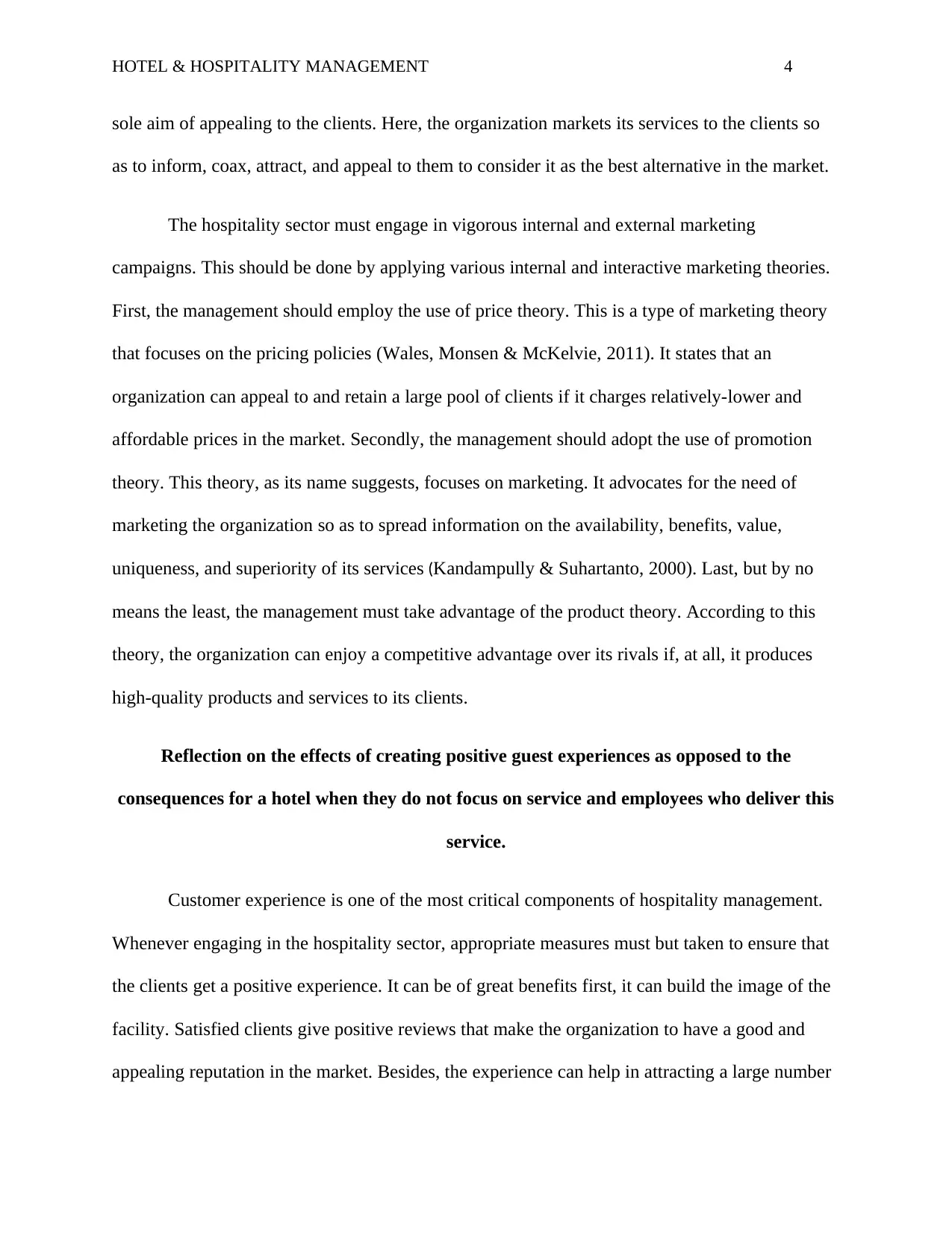
HOTEL & HOSPITALITY MANAGEMENT 4
sole aim of appealing to the clients. Here, the organization markets its services to the clients so
as to inform, coax, attract, and appeal to them to consider it as the best alternative in the market.
The hospitality sector must engage in vigorous internal and external marketing
campaigns. This should be done by applying various internal and interactive marketing theories.
First, the management should employ the use of price theory. This is a type of marketing theory
that focuses on the pricing policies (Wales, Monsen & McKelvie, 2011). It states that an
organization can appeal to and retain a large pool of clients if it charges relatively-lower and
affordable prices in the market. Secondly, the management should adopt the use of promotion
theory. This theory, as its name suggests, focuses on marketing. It advocates for the need of
marketing the organization so as to spread information on the availability, benefits, value,
uniqueness, and superiority of its services (Kandampully & Suhartanto, 2000). Last, but by no
means the least, the management must take advantage of the product theory. According to this
theory, the organization can enjoy a competitive advantage over its rivals if, at all, it produces
high-quality products and services to its clients.
Reflection on the effects of creating positive guest experiences as opposed to the
consequences for a hotel when they do not focus on service and employees who deliver this
service.
Customer experience is one of the most critical components of hospitality management.
Whenever engaging in the hospitality sector, appropriate measures must but taken to ensure that
the clients get a positive experience. It can be of great benefits first, it can build the image of the
facility. Satisfied clients give positive reviews that make the organization to have a good and
appealing reputation in the market. Besides, the experience can help in attracting a large number
sole aim of appealing to the clients. Here, the organization markets its services to the clients so
as to inform, coax, attract, and appeal to them to consider it as the best alternative in the market.
The hospitality sector must engage in vigorous internal and external marketing
campaigns. This should be done by applying various internal and interactive marketing theories.
First, the management should employ the use of price theory. This is a type of marketing theory
that focuses on the pricing policies (Wales, Monsen & McKelvie, 2011). It states that an
organization can appeal to and retain a large pool of clients if it charges relatively-lower and
affordable prices in the market. Secondly, the management should adopt the use of promotion
theory. This theory, as its name suggests, focuses on marketing. It advocates for the need of
marketing the organization so as to spread information on the availability, benefits, value,
uniqueness, and superiority of its services (Kandampully & Suhartanto, 2000). Last, but by no
means the least, the management must take advantage of the product theory. According to this
theory, the organization can enjoy a competitive advantage over its rivals if, at all, it produces
high-quality products and services to its clients.
Reflection on the effects of creating positive guest experiences as opposed to the
consequences for a hotel when they do not focus on service and employees who deliver this
service.
Customer experience is one of the most critical components of hospitality management.
Whenever engaging in the hospitality sector, appropriate measures must but taken to ensure that
the clients get a positive experience. It can be of great benefits first, it can build the image of the
facility. Satisfied clients give positive reviews that make the organization to have a good and
appealing reputation in the market. Besides, the experience can help in attracting a large number
Paraphrase This Document
Need a fresh take? Get an instant paraphrase of this document with our AI Paraphraser
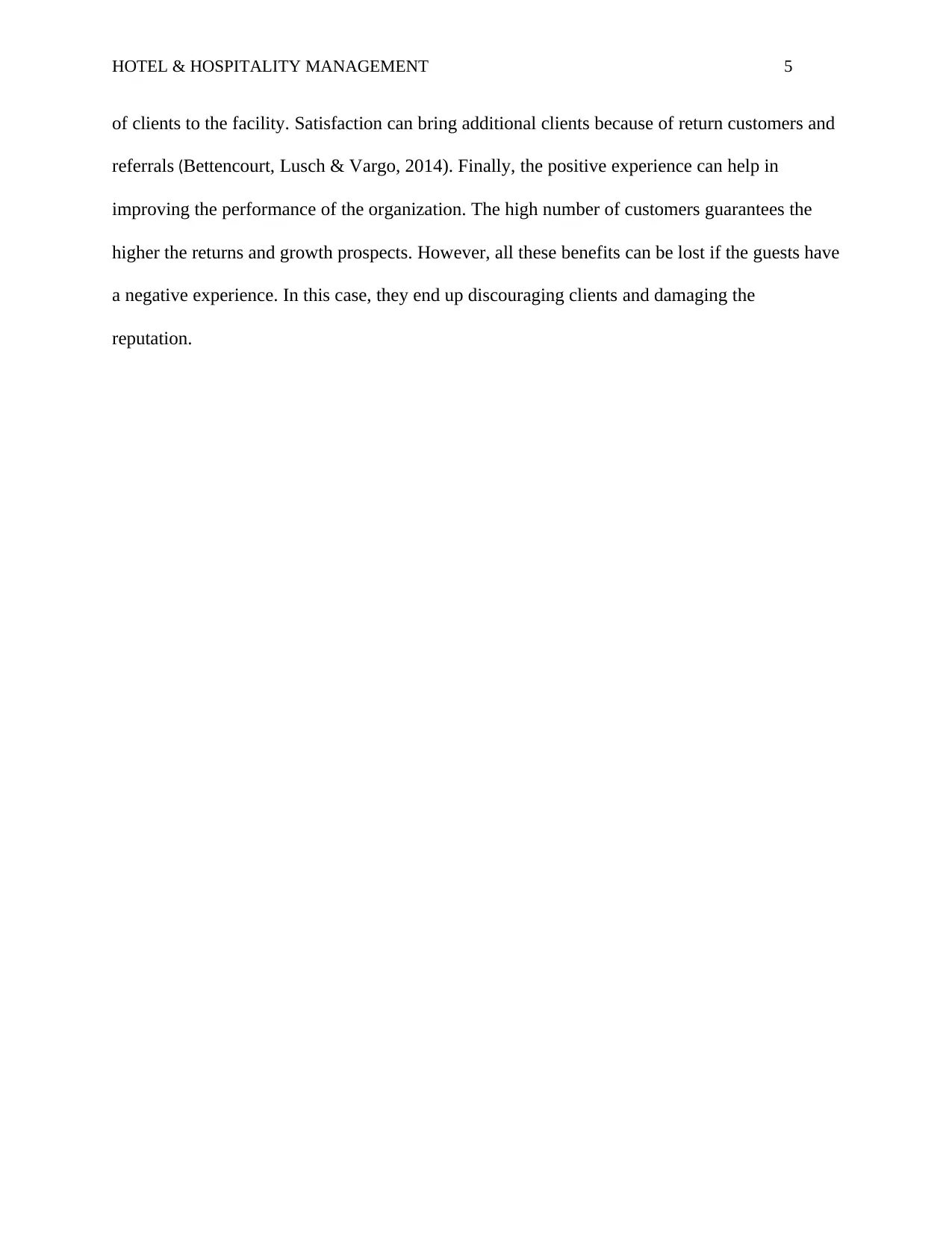
HOTEL & HOSPITALITY MANAGEMENT 5
of clients to the facility. Satisfaction can bring additional clients because of return customers and
referrals (Bettencourt, Lusch & Vargo, 2014). Finally, the positive experience can help in
improving the performance of the organization. The high number of customers guarantees the
higher the returns and growth prospects. However, all these benefits can be lost if the guests have
a negative experience. In this case, they end up discouraging clients and damaging the
reputation.
of clients to the facility. Satisfaction can bring additional clients because of return customers and
referrals (Bettencourt, Lusch & Vargo, 2014). Finally, the positive experience can help in
improving the performance of the organization. The high number of customers guarantees the
higher the returns and growth prospects. However, all these benefits can be lost if the guests have
a negative experience. In this case, they end up discouraging clients and damaging the
reputation.
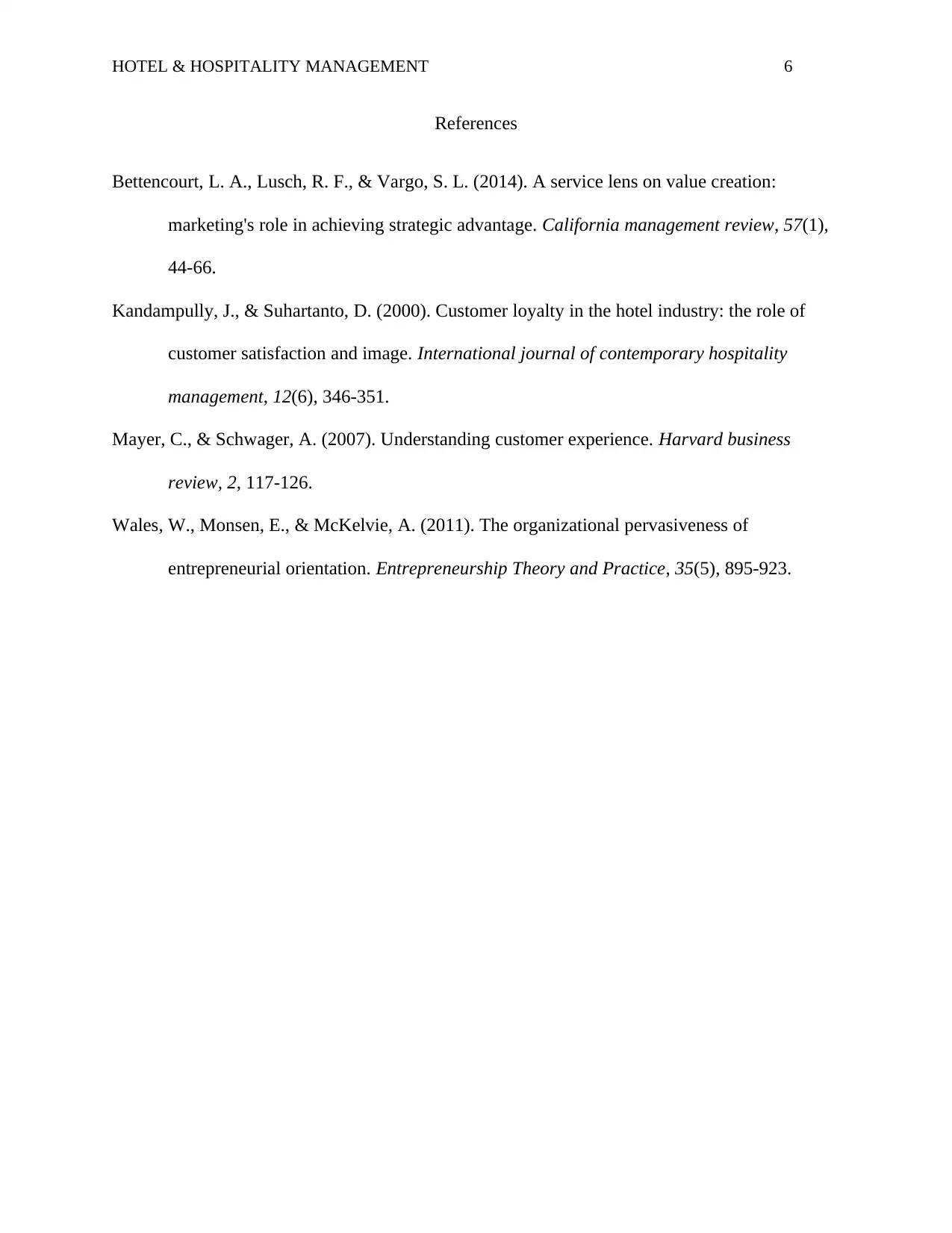
HOTEL & HOSPITALITY MANAGEMENT 6
References
Bettencourt, L. A., Lusch, R. F., & Vargo, S. L. (2014). A service lens on value creation:
marketing's role in achieving strategic advantage. California management review, 57(1),
44-66.
Kandampully, J., & Suhartanto, D. (2000). Customer loyalty in the hotel industry: the role of
customer satisfaction and image. International journal of contemporary hospitality
management, 12(6), 346-351.
Mayer, C., & Schwager, A. (2007). Understanding customer experience. Harvard business
review, 2, 117-126.
Wales, W., Monsen, E., & McKelvie, A. (2011). The organizational pervasiveness of
entrepreneurial orientation. Entrepreneurship Theory and Practice, 35(5), 895-923.
References
Bettencourt, L. A., Lusch, R. F., & Vargo, S. L. (2014). A service lens on value creation:
marketing's role in achieving strategic advantage. California management review, 57(1),
44-66.
Kandampully, J., & Suhartanto, D. (2000). Customer loyalty in the hotel industry: the role of
customer satisfaction and image. International journal of contemporary hospitality
management, 12(6), 346-351.
Mayer, C., & Schwager, A. (2007). Understanding customer experience. Harvard business
review, 2, 117-126.
Wales, W., Monsen, E., & McKelvie, A. (2011). The organizational pervasiveness of
entrepreneurial orientation. Entrepreneurship Theory and Practice, 35(5), 895-923.
⊘ This is a preview!⊘
Do you want full access?
Subscribe today to unlock all pages.

Trusted by 1+ million students worldwide
1 out of 6
Related Documents
Your All-in-One AI-Powered Toolkit for Academic Success.
+13062052269
info@desklib.com
Available 24*7 on WhatsApp / Email
![[object Object]](/_next/static/media/star-bottom.7253800d.svg)
Unlock your academic potential
Copyright © 2020–2025 A2Z Services. All Rights Reserved. Developed and managed by ZUCOL.





